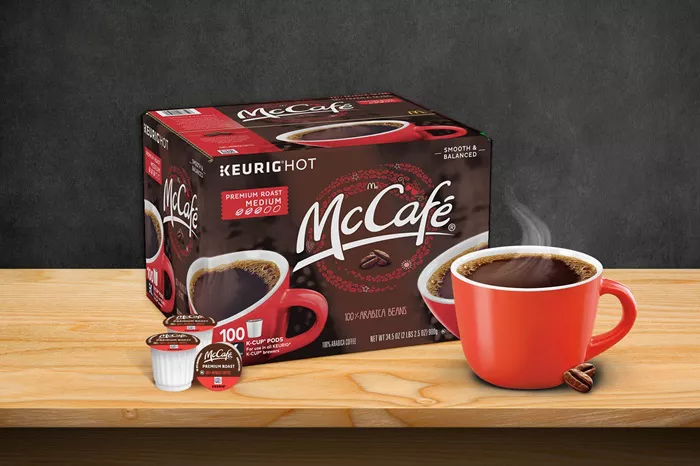How Much Caffeine is in a McCafe K-Cup?
If you’re a coffee lover who uses K-Cups, you may be curious about the caffeine content in your McCafe K-Cup coffee. Caffeine is a key factor for many people when choosing their morning brew, but how much caffeine is actually in one of these convenient coffee pods? In this article, we’ll dive into the exact caffeine content, how it compares to other K-Cups, factors that affect the caffeine level, and what you should know about health considerations and personal tolerance.
Exact Caffeine Content in McCafe K-Cups
A typical 8 oz (250 ml) cup of coffee made with a McCafe K-Cup contains approximately 100 mg of caffeine. This is a moderate amount of caffeine, which is considered standard for many K-Cup coffee pods on the market. If you’re looking for a balanced pick-me-up, McCafe’s caffeine level is right in the middle of what you might expect.
Comparison to Other K-Cups
When compared to other K-Cup brands, the caffeine content in McCafe K-Cups falls within the usual range. Most K-Cups contain 75 to 150 mg of caffeine per 8 oz serving, depending on the brand and type of coffee. McCafe’s 100 mg of caffeine is considered a moderate level, making it similar to many other standard coffee pods. However, if you’re seeking a higher dose of caffeine, you might consider stronger brands or specialty pods designed for a higher caffeine kick.
Factors Affecting Caffeine Content
The caffeine content in McCafe K-Cups can vary depending on several factors:
Type of Coffee Beans: McCafe uses Arabica beans, which generally have a milder caffeine content compared to Robusta beans. Arabica beans tend to be lower in caffeine but are known for their smooth, well-rounded flavor. In contrast, Robusta beans have a stronger, more bitter taste and typically contain more caffeine.
Roast Level: The roast level of the coffee can also influence caffeine content. Dark roasts, such as espresso blends, may appear stronger but actually have slightly less caffeine than lighter roasts. This is because caffeine diminishes slightly during the roasting process.
Amount of Coffee in the Pod: K-Cups contain a predetermined amount of ground coffee, typically around 9-12 grams per pod, which affects the strength of the brew. While McCafe K-Cups maintain a consistent 100 mg of caffeine per 8 oz cup, variations in the amount of coffee used in different pod brands can lead to higher or lower caffeine levels.
Health Considerations
For most healthy adults, the recommended maximum daily caffeine intake is up to 400 mg per day, which is roughly equivalent to four 8 oz cups of coffee. Consuming one McCafe K-Cup (with its 100 mg of caffeine) would contribute about one-quarter of that daily limit. It’s important to keep in mind that caffeine sensitivity varies from person to person, so some individuals may be more affected by caffeine than others.
While moderate caffeine consumption is generally considered safe for most people, it’s important to avoid excessive intake, which can lead to negative side effects like restlessness, anxiety, and sleep disturbances. Pregnant women, individuals with certain health conditions, and those sensitive to caffeine should consult their healthcare provider to determine an appropriate amount of caffeine for their personal needs.
Personal Tolerance and Adjusting Caffeine Intake
Caffeine tolerance varies significantly from person to person. Some people can drink multiple cups of coffee per day without issue, while others may find that even a small amount of caffeine causes jitters or affects their sleep. Here are some tips to gauge and adjust your caffeine intake:
Track Your Response: Pay attention to how your body responds after drinking coffee. If you feel anxious, jittery, or have difficulty sleeping, consider cutting back or switching to a lower-caffeine option.
Start Slowly: If you’re new to coffee or trying to reduce your caffeine intake, start with one McCafe K-Cup per day and monitor how you feel. You can always adjust based on your energy levels and tolerance.
Consider Decaf: If you’re sensitive to caffeine but still want to enjoy a coffee flavor, McCafe also offers decaffeinated options, which contain minimal caffeine but maintain the same smooth taste.
Conclusion
McCafe K-Cups offer a convenient and reliable way to enjoy a cup of coffee with consistent flavor and caffeine content. Each K-Cup delivers about 100 mg of caffeine per 8 oz cup, which is a moderate amount that fits well within the typical caffeine range for K-Cups. For instance, darker roasts tend to have slightly less caffeine per cup, while lighter roasts may contain more, as the roasting process can affect the caffeine content. Additionally, the amount of coffee grounds packed into each pod also influences the overall caffeine strength.
When evaluating your caffeine consumption in the context of your health, it’s helpful to know that most adults can safely consume up to 400 mg of caffeine a day, according to health guidelines. This means that one McCafe K-Cup, with its 100 mg of caffeine, contributes to roughly a quarter of the recommended daily limit. However, individual caffeine tolerance can vary, so it’s always important to listen to your body and adjust your intake accordingly. For some, a single K-Cup may be sufficient to provide the desired energy boost, while others may prefer to limit their intake to prevent potential side effects like jitteriness or disrupted sleep. Being mindful of your own personal caffeine needs and preferences can help you make the most of your coffee experience while staying within safe and healthy limits.
Related topics:
- How Much Caffeine in Decaf Coffee in Australia?
- How Much Caffeine is in a Flat White?
- How Much Caffeine in a Vietnamese Coffee?


